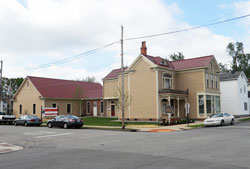‘Work hard. Pray hard. Don’t worry!’: Cardinal Ritter Neighborhood Resource Center opens

Cardinal Ritter Birthplace Foundation in New Albany held a grand opening on April 29 for its newly completed Ritter Neighborhood Resource Center, at left, behind the historic home where Cardinal Joseph E. Ritter was born. The home at 13th and Oak streets already has two agency tenants. (Photo by Patricia Happel Cornwell)
By Patricia Happel Cornwell (Special to The Criterion)
NEW ALBANY—“People have such big hearts,” said David Hock, who spoke at the grand opening of the Cardinal Ritter Neighborhood Resource Center in New Albany on April 29.
Hock, president of the Cardinal Ritter Birthplace Foundation, thanked “a long list” of supporters who donated funds, labor and materials—both to restore the birthplace of Indiana’s first native cardinal, Joseph Elmer Ritter—and to construct a new community center behind the home.
The center, which accommodates about 100 people and has a kitchenette, is connected to the original home by a small, unfinished brick addition which will eventually become a museum about Cardinal Ritter.
Cardinal Ritter was born July 20, 1892, at 1218 E. Oak St. in New Albany, where the front of the home was a bakery operated by his grandparents and parents.
He was ordained a priest in 1917, was appointed an auxiliary bishop of the Diocese of Indianapolis in 1933, and became the bishop of Indianapolis less than a year later. He was installed as the first archbishop of Indianapolis in 1944, and was appointed archbishop of St. Louis in 1946. He was named a cardinal in 1961.
He is noted for his participation in the Second Vatican Council and for the racial integration of Catholic schools in Indianapolis in 1938—16 years before the U.S. Supreme Court made such a policy the law of the land.
Two agency tenants, Home of the Innocents and the Housing Partnership Inc., have outreach offices in the restored home. The foundation board hopes additional nonprofit organizations will house their offices there.
The front of the home was restored in 2007 with a $220,000 grant from the Horseshoe Foundation of Floyd County. Renovation of the rear section was begun shortly afterward, but funds were lacking to finish the interior or install siding.
Completion of the center was made possible by a $190,000 grant from the city of New Albany, part of a $6.7 million award to the city from the federal Neighborhood Stabilization Program.
Susan Kaempfer, program manager for the city’s Midtown Neighborhood Project, said the Ritter Neighborhood Resource Center was the only public project funded out of 30 grants. The others were all residential restorations.
“Ritter House is an anchor for this neighborhood,” she said, “and it was important to help finish it.”
Conventual Franciscan Father Troy Overton, who formerly taught at Cardinal Ritter Jr./Sr. High School in Indianapolis, recalled the first time that he came to the neglected birthplace of the prelate in 1998.
“This was a scary place,” he said. “I wasn’t sure the floor would hold us up.”
Father Troy said he realized that few people knew much about Cardinal Ritter so he set out to create, with his students, a video about the New Albany native.
Referring to the Gospel reading for Mass that day, Father Troy said, “On the shore, Jesus offered a meal of bread and fish, and here Cardinal Ritter’s family baked bread. The bread of life continues to be nurtured in this house.”
Bishop Paul D. Etienne of Cheyenne, Wyo., a Tell City native and former pastor of Our Lady of Perpetual Help Parish in New Albany, was the guest of honor at the event. He was an early board member of the Ritter Foundation. He said the love that Cardinal Ritter experienced growing up in the house enabled him to give his life in service to others.
“That’s the way God works in our lives,” Bishop Etienne said, “and so many of you have given to make this project come to life. But your generosity and prayers continue to be needed to sustain this work of justice.”
A motto of Cardinal Ritter is an apt summary of the community efforts that have brought life back to his childhood home: “Work hard. Pray hard. Don’t worry!”
(Patricia Happel Cornwell is a member of St. Joseph Parish in Corydon.) †
